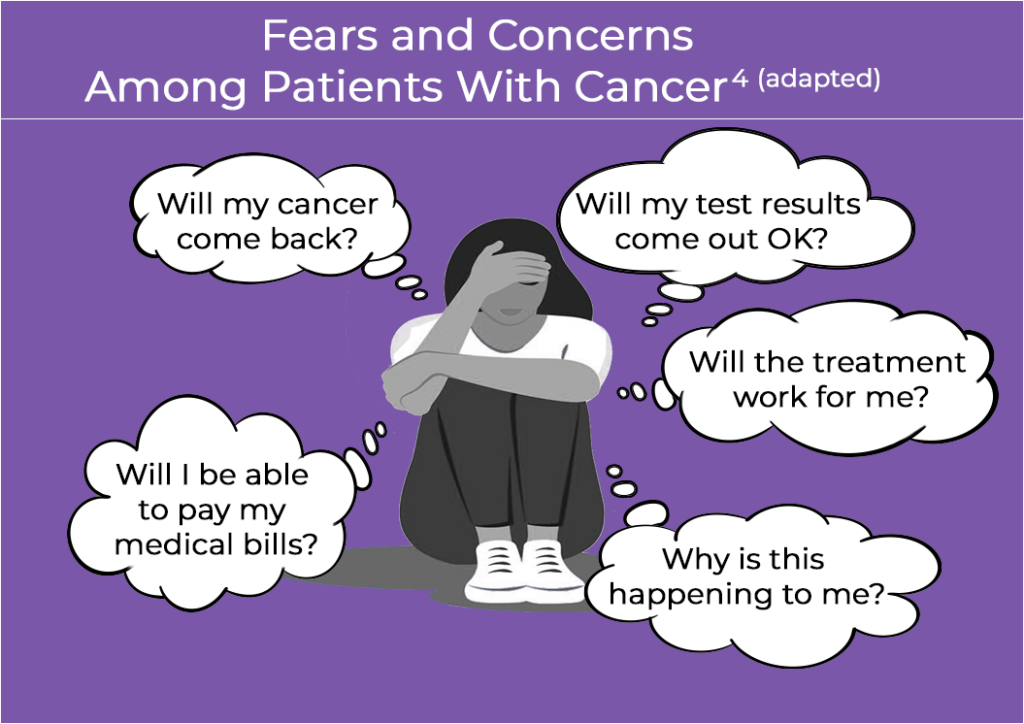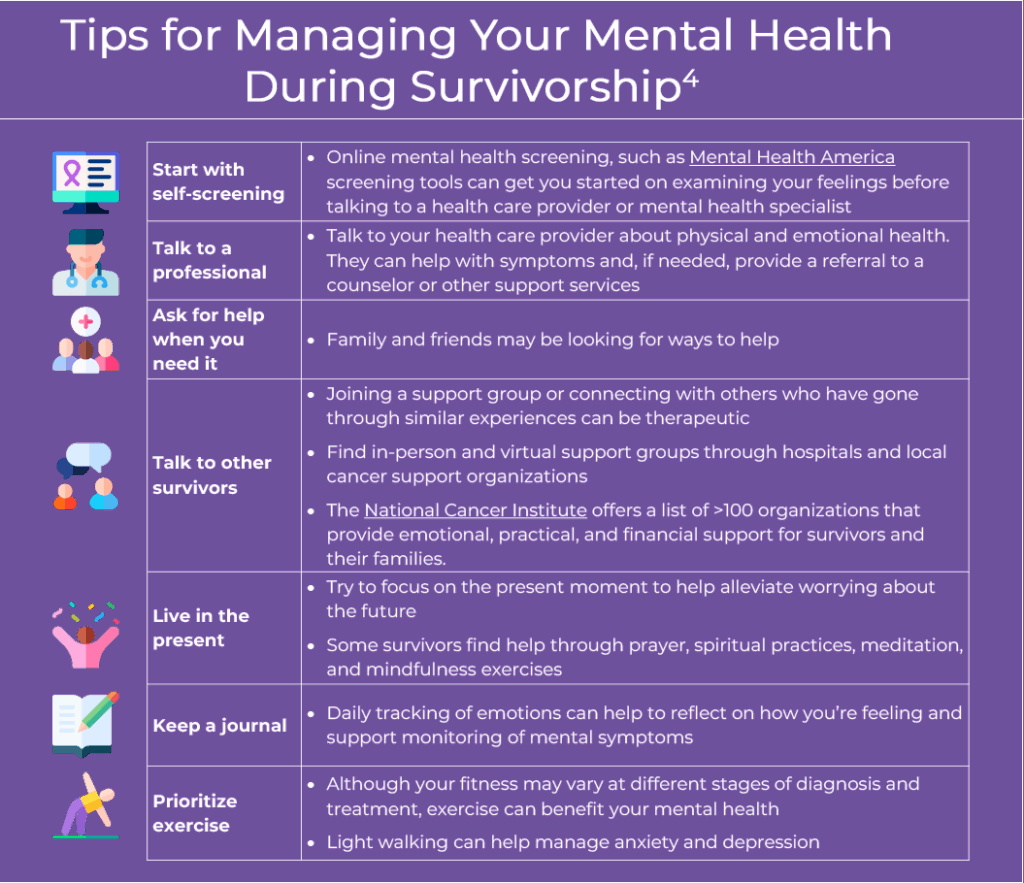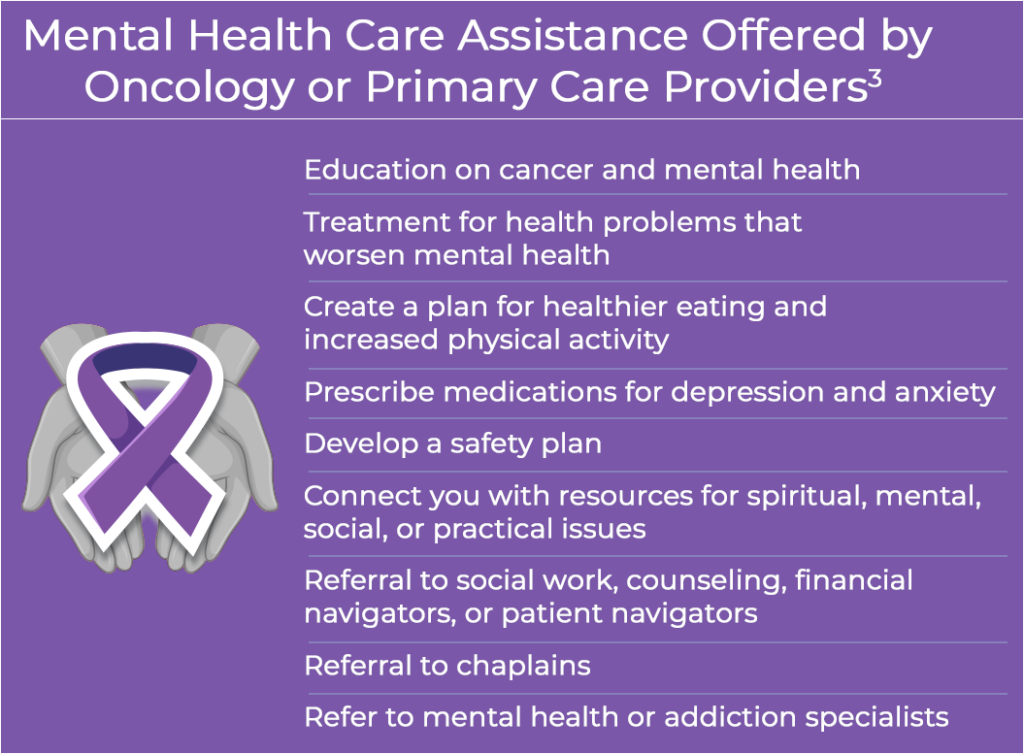Staying Mentally Healthy
Staying Mentally Healthy
The emotional journey of cancer – you don’t have to face it alone
Being diagnosed with cancer and going through treatment can be life changing. These experiences affect not only your physical health but can take a toll on your mental and emotional well-being. If you have cancer and feel distressed, you are not alone –as many as 50% of patients report feeling a significant of distress.1,2,3 In addition, psychological changes affect not only patients, but caregivers and family members too.3 Being diagnosed with cancer can affect relationships, work, and finances, and can potentially trigger development of psychological stress, depression, and anxiety.2,3 Unfortunately, these challenges usually don’t stop just because treatment is over.3
Symptoms of Distress, Depression, and Anxiety
It’s important for patients as well as caregivers and family members to recognize mental health symptoms, such as distress, depression, and anxiety while going through treatment. This is sometimes challenging since mental health symptoms may overlap cancer symptoms or side effects from treatment; for example, changes in appetite, weight, sleep, concentration, and motivation. For this reason, it’s important to communicate openly and honestly with your care team and people in your support system about how you are feeling.4
Distress is very common among cancer survivors but also affects family members and caregivers. It can range from mild to severe and may include feeling sad, worried, or angry. Because distress can impact mental, physical, social, and spiritual aspects of your life, it can affect the way you think, feel, and act.3Other symptoms of distress may include a sense of helplessness or loss of control; questioning your purpose or meaning in life; pulling away from family and friends; or worrying about your role at home or in social settings.4
Symptoms of depression may include feeling emotionally numb, nervous, or overwhelmed with guilt; experiencing mood swings or difficulty concentrating; losing interest in activities you once enjoyed; having thoughts of self-harm or suicide; and sleep problems like insomnia, oversleeping, or nightmares. Physical symptoms are also common, such as a racing heart, dry mouth, sweating, stomach upset, or headaches, as are noticeable changes in your energy level.4
Symptoms of anxiety may include constant or uncontrollable worry, trouble focusing your thoughts, muscle tension, trembling or shaking, feeling restless, having a dry mouth, and experiencing irritability or sudden angry outbursts.
It’s important to remember that mental health is just as important as physical health during cancer treatment and recovery. Taking care of your emotional well-being is a key part of healing. The table below outlines steps that you can take to seek help when you are experiencing symptoms of depression, anxiety, or other mental health issues.4
Access the MHA mental health online screening tool here
Cancer.gov also has many resources for cancer support groups, which can be accessed here
Addressing Mental Health Concerns
Routine mental health screening by primary care clinicians is always important, but it’s especially critical during times when patients may be more vulnerable to distress such as before or after medical tests, during routine health care visits, or when new symptoms start. It’s important to know that feeling distressed is normal and it happens to most survivors at some point.3
You may need a more in-depth mental health assessment to understand the types and causes of your problem and to rule out other health conditions. If so, below is a list of areas will be looked at:3
- Emotional signs: Feeling worried, sad, or easily irritated
- Physical symptoms: Pain, low energy, or a racing heartbeat
- Daily functioning: Difficulty with self-care, chores, or staying focused
- Medical issues: Illness, infections, side effects from medications, or fertility concerns
- Mental health history: Past trauma, substance use, or suicide attempts
- Social factors: Support system, job situation, insurance coverage, or spiritual beliefs
Your oncology or primary care provider may offer support to help you manage stress, anxiety, or depression—this may include education on coping strategies or a referral to a mental health specialist (eg, social worker, psychologist, psychiatrist, or advanced practice provider). Treatment for depression or anxiety may also include medication, which your doctor or mental health provider can determine is right for you. Avenues for mental health and emotional assistance available from primary care and oncology providers are listed below.3
When to Seek Immediate Help
If you or a loved one is experiencing thoughts of suicide or self-harm, call, text, or chat 988 (Suicide & Crisis Lifeline) or go to the nearest emergency room. Don’t wait—help is available 24/7.5
For more information, please visit Resources and Support Networks
References
- American Cancer Society. Mental Health and Distress. https://www.cancer.org/treatment/treatments-and-side-effects/physical-side-effects/emotional-mood-changes.html
- Shalata W, Gothelf I, Bernstine T, et al. Mental health challenges in cancer patients: A cross-sectional analysis of depression and anxiety. Cancers (Basel). 2024;16:2827. doi:10.3390/cancers16162827
- National Comprehensive Cancer Network Guidelines for Patients®. Survivorship Care for Cancer-Related Late and Long-Term Effects. 2024. https://www.nccn.org/patients/guidelines/content/PDF/survivorship-crl-patient.pdf
- Georgetown University School of Nursing. Managing Mental Health After Cancer Diagnosis. October 14, 2021. https://online.nursing.georgetown.edu/blog/cancer-mental-health/
- 988 Lifeline. The Lifeline and 988. https://988lifeline.org/current-events/the-lifeline-and-988/
ALL URLs accessed October 28, 2025




